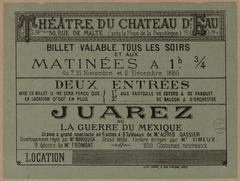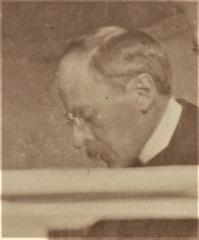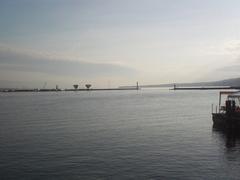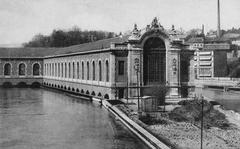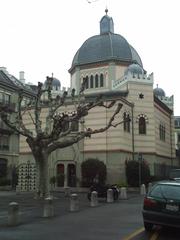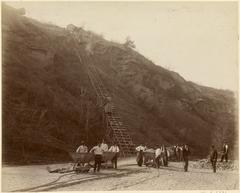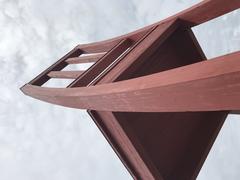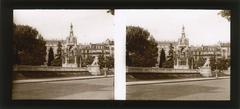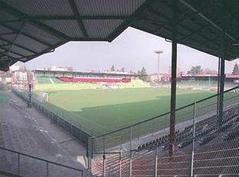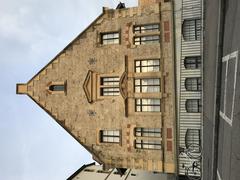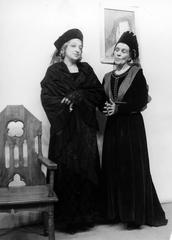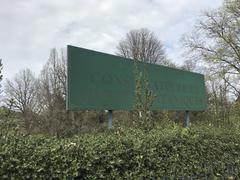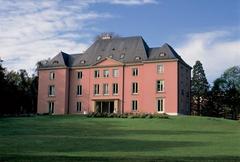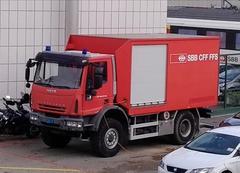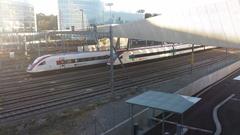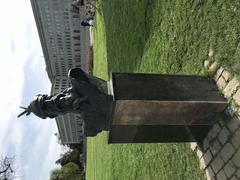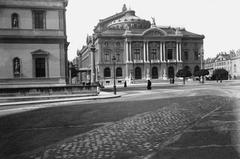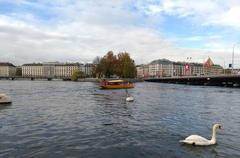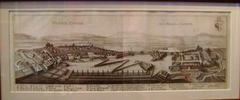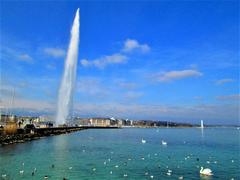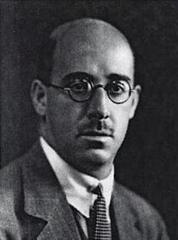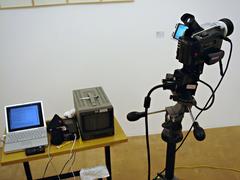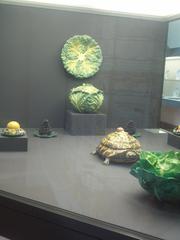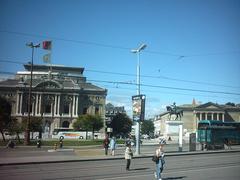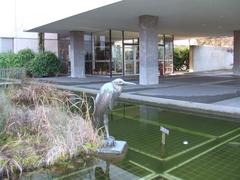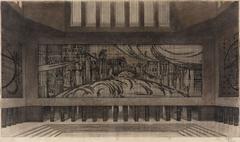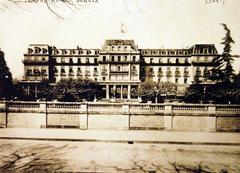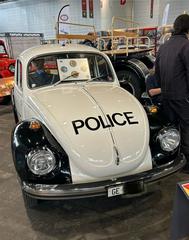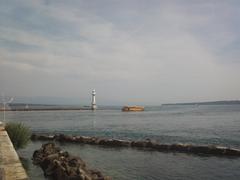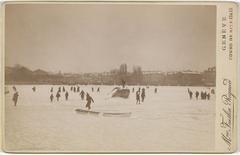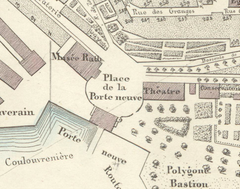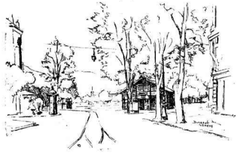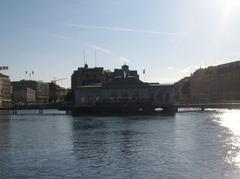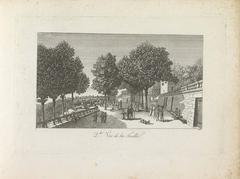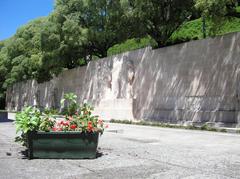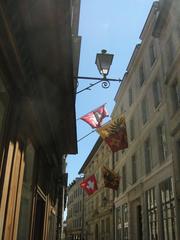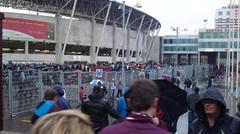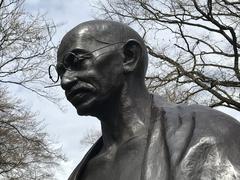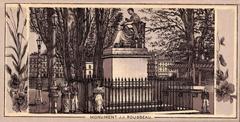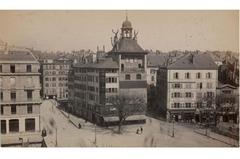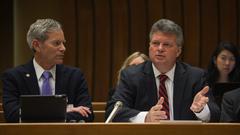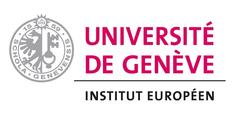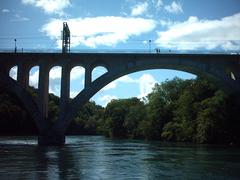Campus Biotech Geneva: Visiting Hours, Tickets, and Comprehensive Guide
Date: 15/06/2025
Introduction
Campus Biotech, situated in Geneva’s dynamic Sécheron district near Lake Geneva, stands as a symbol of scientific innovation, sustainable architecture, and historical transformation. Originally the site of the Sécheron engineering company, this landmark has evolved from an industrial hub into a world-renowned center for biotechnology, neuroscience, and digital health research (Campus Biotech History). Since its creation in 2013 by a consortium including EPFL, the University of Geneva, and philanthropic partners such as the Wyss and Bertarelli Foundations, Campus Biotech has cultivated an ecosystem that seamlessly bridges academic research, clinical applications, and entrepreneurship (EPFL News; FCBG Mission).
Campus Biotech artfully unites its 19th-century industrial heritage—showcased in its iconic redbrick buildings—with cutting-edge, sustainable design. Notable features include energy management systems that leverage Lake Geneva’s resources and eco-friendly building standards (Geneva Tourism; Campus Biotech Leasing). Spanning over 40,000 m², the campus is home to more than 500 researchers, start-ups, and companies at the forefront of fields like neuromodulation, brain-computer interfaces, and personalized medicine (Switzerland Innovation; BioAlps Events).
This guide provides you with essential information to plan your visit—covering Campus Biotech’s history, access and visiting hours, sustainable architecture, research highlights, and recommendations for exploring nearby Geneva attractions.
Table of Contents
- Historical Background and Development
- Visitor Information: Hours, Tickets, and Access
- What to See and Do at Campus Biotech
- Sustainable Architecture and Green Initiatives
- Nearby Attractions and Travel Tips
- FAQ: Visiting Campus Biotech
- Summary and Planning Your Visit
- References
Historical Background and Development
Origins and Transformation
The Campus Biotech site was initially occupied by the Sécheron engineering company, a key player in Geneva’s industrial history (Campus Biotech History). After its industrial phase, Merck Serono invested significantly, establishing a state-of-the-art complex in 2006. The closure of Merck Serono’s Geneva headquarters in 2012 opened the door for a new vision: retaining the site for science and innovation rather than commercial real estate (EPFL News).
In 2013, a consortium led by EPFL, the University of Geneva, the Bertarelli family, and philanthropist Hansjörg Wyss acquired the site, aiming to create a world-class hub for biotechnology and neuroscience (Campus Biotech Consortium). The Wyss Foundation’s CHF 100 million donation further anchored Geneva as a leader in life sciences innovation.
Growth and Key Milestones
- 2013: Site acquisition and founding of Fondation Campus Biotech Genève (FCBG)
- 2014 onwards: Arrival of anchor institutions, including the Wyss Center, EPFL, UNIGE, and HUG (Campus Biotech Partners)
- 2015–2025: Expansion of research groups, start-ups, and major projects, including the launch of the AI Health Hub in partnership with Geneva University Hospitals (HUG AI Health Hub)
The campus continues to evolve, recently adding the AI Health Hub—dedicated to harnessing artificial intelligence for neurological and psychiatric disorders—further cementing its reputation for translational research and healthcare innovation.
Visitor Information: Hours, Tickets, and Access
Visiting Hours
Campus Biotech is primarily an active research and innovation campus rather than a standard public museum. There are no fixed public visiting hours. Instead, access for visitors is typically provided through:
- Scheduled guided tours
- Open days and public events
- Booked group visits
For up-to-date information, check the Campus Biotech official website and the BioAlps Events calendar.
Tickets and Entry
- General access: Most public areas are free to enter during open days or events.
- Research facilities: Require authorization; guided tours may be available on special dates or by prior arrangement.
- Events and workshops: Some may require prior registration or a small fee—details are announced in advance.
Accessibility
Campus Biotech is fully accessible, offering barrier-free access, wheelchair ramps, and accessible restrooms (EPFL Visitor Guide). Visitors with special needs should contact the campus ahead of their visit.
Getting There
- Address: 9 Chemin des Mines, 1202 Geneva
- Public transport: Served by tram lines 12 and 18 (‘Nations’ stop), several bus routes, and close to Genève-Sécheron railway station (Geneva.info)
- Car and cycling: Limited on-site parking; bike parking available; electric vehicle charging stations provided (Campus Biotech Leasing)
What to See and Do at Campus Biotech
Guided Tours and Public Events
- Guided tours: Explore the campus’s research labs, sustainable features, and innovation ecosystem. Advance booking is recommended.
- Public events: Participate in seminars, lectures, workshops, and innovation days—ideal for science enthusiasts and professionals (BioAlps Events).
- Educational programs: Experience citizen dialogues on topics like AI ethics and digital health.
Research Highlights
- Wyss Center for Bio and Neuroengineering: Focuses on neurotechnology and brain-computer interfaces.
- Synapsy Centre and Neuro X Institute: Leaders in neuroscience and translational research.
- AI Health Hub: Dedicated to AI-guided neuromodulation and digital health (HUG AI Health Hub).
Photographic and Interactive Experiences
- Architecture: Capture the iconic redbrick buildings and modern glass facades.
- Virtual tours: Available on the Campus Biotech website.
- Interactive displays: On-site multimedia exhibits showcase ongoing research.
Sustainable Architecture and Green Initiatives
Campus Biotech exemplifies eco-conscious urban development:
- Energy efficiency: Harnesses Lake Geneva’s renewable energy for heating and cooling, with high-performance glass façades and centralized plant rooms (Campus Biotech Leasing).
- Green building standards: Participates in Geneva’s eco-neighbourhood initiatives (Geneva Tourism).
- Mobility: Well integrated with public transport, cycling infrastructure, and electric vehicle support.
- Waste reduction: Swiss-standard recycling and initiatives to reduce single-use plastics.
Upcoming expansions, such as Building B4, will further enhance the campus’s sustainable design credentials.
Nearby Attractions and Travel Tips
Take advantage of Campus Biotech’s prime location to explore Geneva’s top sights:
- Old Town (Vieille Ville): Medieval streets, St. Pierre Cathedral, and historical landmarks.
- Lake Geneva: Scenic promenades and parks.
- International organizations: United Nations Office, International Red Cross and Red Crescent Museum.
- Cultural activities: Geneva’s museums, gastronomy, and shopping districts.
Travel tip: Hotel guests receive a free Geneva Transport Card, enabling unlimited use of public transport (Geneva.info).
FAQ: Visiting Campus Biotech
Q: What are the opening hours?
A: No fixed public hours. Access is through scheduled tours, events, or by appointment.
Q: Do I need tickets to visit?
A: Public areas and events are generally free; some events require registration.
Q: How do I book a tour?
A: Contact Campus Biotech via their website or subscribe to newsletters for announcements.
Q: Is the campus accessible for people with disabilities?
A: Yes, with barrier-free routes and facilities (EPFL Visitor Guide).
Q: What are the best nearby attractions?
A: Lake Geneva, Geneva Old Town, United Nations, and the Red Cross Museum.
Summary and Planning Your Visit
Campus Biotech offers a distinctive blend of Geneva’s industrial legacy and its leadership in global health innovation. Visitors can immerse themselves in cutting-edge science, sustainable design, and a vibrant cultural landscape. Since access to research facilities is mainly by appointment or during public events, planning ahead is essential. Leverage Geneva’s excellent public transit, explore sustainable features, and enrich your itinerary with the city’s renowned landmarks.
Stay updated by following Campus Biotech and its partners on social media, and consider downloading the Audiala app for curated local experiences and guided tours.
References
This guide was created using the following official sources and resources:
- Campus Biotech History (Campus Biotech History)
- Green Light for Campus Biotech (EPFL News)
- Fondation Campus Biotech Genève Mission (FCBG Mission)
- Switzerland Innovation Park West EPFL Overview (Switzerland Innovation)
- HUG AI Health Hub Announcement (HUG AI Health Hub)
- Campus Biotech Leasing: Sustainable Buildings (Campus Biotech Leasing)
- Geneva Tourism: Campus Biotech (Geneva Tourism)
- BioAlps Events (BioAlps Events)
- EPFL Visitor Guide (EPFL Visitor Guide)
- Geneva.info: Visitor Tips and Transport (Geneva.info)
Images and interactive maps are available on the official Campus Biotech website. Internal links to other Geneva guides and sustainability features can enhance your planning and experience.
